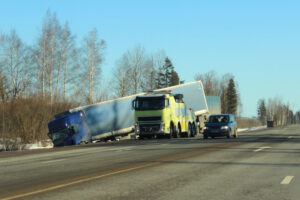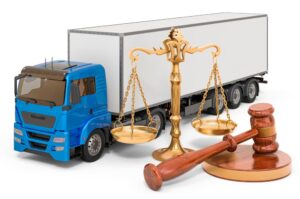Common Types of Truck Accidents
Truck accidents frequently happen when truck drivers – or the trucking companies that employ them – behave recklessly or carelessly. If you suffered injuries in a recent trucking accident, it’s essential that you speak with a knowledgeable truck accident lawyer in your area as soon as possible.
An experienced truck accident lawyer can first investigate the circumstances surrounding your accident and determine your options for recovering compensation. Your lawyer can then file a truck accident claim or lawsuit on your behalf, represent you during settlement negotiations, or handle your case in court.
Truck Accident Categories
Truck accidents are a serious concern on area roads, often leading to severe injuries, fatalities, and significant property damage. Negligence by truck drivers and trucking companies is a common cause of these accidents. Here are some of the most common types of truck accidents that occur due to negligence:
- Rear-End Collisions – These accidents happen when a large truck crashes into the vehicle in front of it. Due to the massive weight and size of trucks, stopping them requires more time and distance compared to smaller vehicles. If a truck driver is distracted, fatigued, or following too closely, they may be unable to stop in time, leading to a rear-end collision.
- Jackknife Accidents – These accidents occur when a truck’s trailer swings out to the side, forming an angle with the cab, resembling a folding jackknife. This can happen if the driver brakes suddenly or turns too sharply. Jackknifing often results from excessive speeding, slippery roads, or improper loading of cargo by truck drivers or trucking companies. Negligent driving practices, such as aggressive driving or failing to adjust to road conditions, can trigger these accidents.
- Rollover Accidents – Trucks have a high center of gravity, making them susceptible to rollovers. These accidents frequently happen when a truck tips over onto its side or roof. Common causes include speeding, taking curves too quickly, and abrupt maneuvers. A negligent truck driver who fails to slow down on sharp turns or drives recklessly is at a higher risk of causing a rollover.
- Blind Spot Accidents – Trucks have large blind spots – or areas where the driver’s view is obstructed. If a truck driver fails to check these blind spots before changing lanes or merging, they can collide with other vehicles. Negligence in adequately monitoring blind spots, coupled with improper mirror adjustment, significantly contributes to these types of accidents.
- Tire Blowouts – A tire blowout can cause a truck driver to lose control of their vehicle, leading to accidents. Negligence in maintaining and inspecting tires for wear and tear can result in blowouts. Overloading the truck can also cause excessive stress on the tires, increasing the likelihood of a blowout.
- Head-On Collisions – These accidents can occur when a truck collides with another vehicle coming from the opposite direction. Driver fatigue, distracted driving, and impaired driving are common negligent behaviors that can cause a truck to drift into oncoming traffic, resulting in head-on collisions.
Common Injuries in a Truck Accident
Truck accidents often result in serious physical and mental injuries due to the sheer size and weight of trucks compared with other vehicles. These injuries can be life-altering and may require extensive medical treatment and long-term care. The most common physical and mental injuries that result from truck accidents include:

Physical Injuries:
- Traumatic Head and Brain Injuries (TBIs) – These can include concussions or severe TBIs that lead to coma and permanent disability. A strong impact can cause the victim’s brain to collide with their skull, leading to serious damage. Symptoms may include headaches, dizziness, memory loss, and cognitive impairments.
- Spinal Cord Injuries – Damage to the spinal cord may result in partial or complete paralysis. Such injuries can significantly affect mobility and require lifelong medical support and rehabilitation.
- Broken Bones – The strong force of a truck collision can easily fracture bones. Common fractures occur in the arms, legs, ribs, and pelvis. These injuries often need surgery and can take many months to heal.
- Internal Injuries – Organs like the liver, kidneys, and spleen can be damaged in a crash. Internal bleeding is a serious risk that requires immediate medical attention.
- Whiplash and Neck Injuries – The sudden jolt from an accident can cause whiplash, where the neck rapidly snaps back and forth. This can lead to chronic pain and reduced range of motion.
- Burns – If a truck accident results in a fire or explosion, victims may suffer from severe burns. These injuries often require extensive skin grafts and can leave lasting scars.
Mental Injuries:
- Post-Traumatic Stress Disorder (PTSD) – Experiencing a traumatic event like a truck accident can lead to PTSD. Symptoms may include flashbacks, nightmares, severe anxiety, and uncontrollable thoughts about the accident.
- Depression – The aftermath of a serious injury can also lead to severe depression. The sudden changes in lifestyle, loss of mobility, or chronic pain may contribute to feelings of hopelessness and sadness.
- Anxiety – Survivors of truck accidents can also develop various anxiety disorders. They may fear driving or riding in vehicles, which can disrupt daily life and limit independence.
- Emotional Distress – Victims often experience a range of emotional issues, including anger, irritability, and mood swings. Coping with the aftermath of a truck accident can be both physically and mentally exhausting.
Settling or Litigating a Truck Accident Claim

Settling or litigating a truck accident case involves several important steps, including all of the following:
- Seek Ongoing Medical Attention for Injuries – Following a truck accident, victims should seek ongoing medical attention and follow through with all treatment recommendations. This step is crucial for both health and legal reasons. Specifically, medical records serve as important evidence of the victim’s injuries.
- Retain an Attorney – Victims should also hire an experienced truck accident attorney. Lawyers who routinely handle truck accident matters understand the unique aspects of these cases, including federal regulations governing trucking companies.
- Investigation – A skilled truck accident attorney will also conduct a thorough investigation. This includes collecting evidence such as police reports, witness statements, and photographs of the accident scene. The attorney may also gather data from the truck’s black box, maintenance records, and the driver’s logbook to determine if negligence likely occurred.
- Determine Liability – Establishing liability is a critical step in a truck accident case. The at-fault party may be the truck driver, the trucking company, the manufacturer of a faulty truck part, or even the company responsible for loading the truck. Sometimes, multiple parties are at fault for a truck accident.
- File a Claim – Once liability is determined, the attorney will file a claim with the insurance company for the at-fault party. This claim will detail the injuries, damages, and the amount of compensation sought.
- Negotiation – Insurance companies often try to settle claims quickly – and for as little money as possible. The attorney will negotiate with the insurance company to reach a fair settlement. This stage can involve multiple rounds of offers and counteroffers.
- Settlement – If both parties agree on a settlement amount, the case is resolved without going to court. The victim then receives compensation, which can cover medical bills, lost income, and other damages. Settling is often quicker and less stressful than going to trial.
- Litigation – If a fair settlement cannot be reached, the case may go to court. The attorney will file a lawsuit, and both sides will prepare for trial. This includes gathering additional evidence, deposing witnesses, and crafting legal arguments.
- Trial – During the trial, both sides present their case to a judge or jury. The attorney will argue on behalf of the victim, aiming to prove negligence and secure compensation. The judge or jury will then deliver a verdict.
Navigating a truck accident case requires careful attention to detail and a thorough understanding of the legal process. With the right legal support, victims can improve their chances of receiving fair compensation for their injuries and losses.
How to Prove a Truck Accident Case

In truck accident claims and lawsuits, gathering and presenting strong evidence is crucial to establishing liability and securing fair compensation. Different types of evidence can play a significant role in proving the extent of damages and identifying who is at fault. Here are the most important types of evidence in truck accident cases:
- Accident Scene Evidence – Immediately after a truck accident, evidence from the scene is vital. This includes photographs and videos showing vehicle positions, road conditions, skid marks, and any visible injuries. These visuals can help reconstruct the accident and clarify how it occurred.
- Police Reports – A police report is a critical piece of evidence in a truck accident case. It contains the responding officer’s observations, statements from involved parties and witnesses, and sometimes the officer’s opinion on who was at fault. This official document provides a factual account of the accident, which is valuable in court.
- Witness Statements – Witnesses can provide unbiased accounts of the accident. Their testimonies can corroborate the victim’s version of events and help to establish the sequence of actions leading to the crash. Collecting contact information and detailed statements from witnesses as soon as possible is essential.
- Driver Logs and Records – Truck drivers are required to maintain logs detailing their hours of service. These logs can reveal whether the driver was adhering to regulations or if they were fatigued due to exceeding their driving hours. This information can be pivotal in proving negligence.
- Electronic Logging Device (ELD) Data – Modern trucks are equipped with ELDs that record data about the truck’s operation, such as speed, braking patterns, and hours driven. This electronic data can provide a precise account of the driver’s actions leading up to the accident and can be crucial in determining fault.
- Truck Maintenance Records – Trucking companies must keep thorough records of vehicle maintenance. These records can show whether the truck was properly maintained or if mechanical failures contributed to the accident. Neglecting regular maintenance can be a sign of the company’s negligence.
- Black Box Data – Many trucks have a “black box” or event data recorder (EDR) that captures detailed information about the truck’s operation before and during a crash. This can include the truck’s speed, throttle position, brake application, and more. Analyzing this data helps to clarify the actions that the truck driver took before the accident.
- Medical Records – Medical records document the injuries sustained in the accident and the treatment required. These records are essential for proving the extent of injuries and the associated costs, which are necessary for determining fair compensation.
- Expert Testimony – Experts such as accident reconstructionist, medical professionals, and engineers can provide professional insights that support the case. Their analysis and testimony can help explain complex aspects of the accident and injuries to a judge or jury.
Collecting and presenting these types of evidence effectively can significantly strengthen a truck accident claim or lawsuit, helping to establish liability and ensure that victims receive the compensation they deserve.
Recovering Third-party Damages Following a Truck Accident

When someone is involved in a truck accident, the aftermath can be overwhelming, both physically and financially. Victims often face significant medical expenses, lost income, and emotional distress. In truck accident cases, there are several types of compensation that victims can recover to help them cope with these effects. Here are the main types:
- Related Medical Expenses – This includes the cost of emergency room visits, hospital stays, surgeries, medications, physical therapy, and any ongoing medical care required due to the truck accident. Future medical expenses can also be covered if ongoing treatment or rehabilitation is needed.
- Lost Income – If the victim cannot work due to their injuries, they can claim compensation for lost earnings. This covers the income they would have earned if they had not suffered an injury. If the injuries result in a long-term or permanent inability to work, the victim can also seek compensation for loss of future earnings.
- Property Damage – Truck accidents often result in significant damage to vehicles and other personal property. Victims can recover the cost of repairing or replacing their damaged property, including their car and any personal items that were destroyed in the accident.
- Pain and Suffering – Pain and suffering compensation is awarded for the physical pain and emotional distress that the victim experienced as a direct result of the accident. This type of compensation is more subjective and varies depending on the severity of the injuries and their effect on the victim’s life.
- Emotional Distress – Emotional distress compensation addresses the psychological effects of the accident, such as depression, anxiety, and post-traumatic stress disorder (PTSD). This compensation recognizes that the effects of an accident are not just physical but can also significantly affect mental health.
- Loss of Consortium – In cases where the victim’s injuries affect their relationship with their spouse or family, they may be entitled to compensation for loss of consortium. This covers the loss of affection, support, and companionship resulting from the truck-accident injuries.
- Punitive Damages – In some cases, the court may award punitive damages. These damages do not compensate the accident victim for losses but punish the at-fault party for egregious, intentional, or grossly reckless behavior.
Recovering these types of compensation can help truck accident victims rebuild their lives by covering their financial losses and addressing the broader effects of the accident on their well-being.
Contact an Experienced Truck Accident Lawyer in Your Area Right Away
If you suffered injuries in an accident that resulted from a truck driver or trucking company’s negligence, you have legal options available to you. A knowledgeable Tampa personal injury attorney in your area can discuss your options with you and file a claim or lawsuit to seek the compensation and justice you need.
Boohoff Law, P.A. — Auto Accident Lawyers – Tampa Office
829 W Dr Martin Luther King Jr Blvd
Tampa, FL 33603
Phone: 813-725-5606
Free Consultation
We Are Here For You 24/7
Reviews
– Elissa M.
“Really pleased with Boohoff Law! Received immediate responses when I had any questions. Treated amazingly by all staff … made this process a true breeze!”
– Caitlyn M.
– Brandy K.
Related Posts
Lowball Offer for Your Totaled Car? What To Do When Your Car Was Totaled and the Insurance Offer Seems Too Low
Wrecked Without a Buckle: Can I File a Claim if I Wasn’t Wearing a Seatbelt in a Car Accident?
Sidelined by a Sudden Door? Figuring Out Who Is Liable in a Dooring Bicycle Accident
Recovery is personal.
We’re here for you.
We’re close by. And if you can’t make it to us, we’ll meet you where you need us, at home or in the hospital.
You're better off with Boohoff.











The information on this website is for general information purposes only. Nothing on this site should be taken as legal advice for any individual case or situation. This information is not intended to create, and receipt or viewing does not constitute, an attorney-client relationship.
available 24/7
(877) 999-9999
